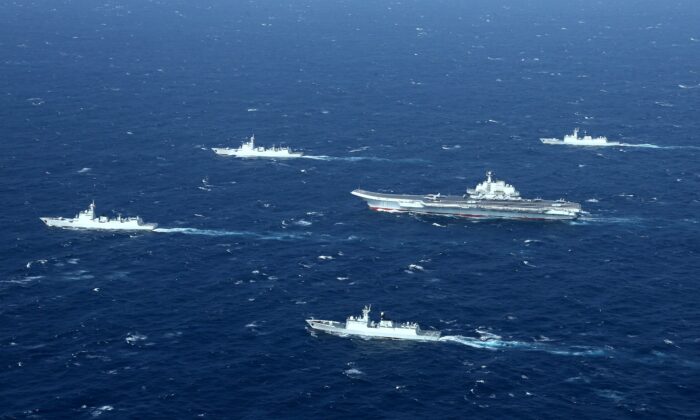
Chinese aircraft carrier Liaoning (C) is participating in military drills in the South China Sea on Jan. 2, 2017. (STR/AFP via Getty Images)
China conducts extensive maritime drills at secret locations
By
News Analysis
China’s recent naval exercises coincide with the warning delivered by China’s defense minister at a major security summit earlier this month: China would “fight a war at any cost” if Taiwan were to pursue its independence.
Several Chinese media reported on the military exercises on June 16. They revealed that the Chinese navy might use civilian ships as camouflage to escort their military forces when fighting a naval war.
A more detailed report by China Military, China’s most authoritative outlet for military news, revealed on June 15 that a brigade of the 80th Group Army, in conjunction with civilian maritime transport forces, conducted a maritime long-range military power projection exercise.
China Military said such drills are meant to practice rapid deployment of joint forces into the target area.
Beijing has not disclosed the exact date and location of the military drills.
The 80th Group Army is a division of the Northern Theater Command. China’s People’s Liberation Army (PLA) has five Theater Commands—the Eastern Theater Command, the Southern Theater Command, the Western Theater Command, the Northern Theater Command, and the Central Theater Command.
According to Chinese state media, troops under three commands—Eastern, Southern, and Northern Theater Commands—participated in the drills. Soldiers, weapons, and equipment were transported by large civilian ships day and night across the waters. Upon arriving at their undisclosed location, they quickly unloaded and assembled military equipment.
It’s noteworthy that before this drill, it was rare for the PLA to use civilian ships to conduct naval exercises. This suggests that using civilian ships as a cover to transport military forces could be an important military strategy that the CCP will consider using in the event of a war with Taiwan.
A Warning From Beijing
During the Shangri-La Dialogue security summit in Singapore on June 11, U.S. Secretary of Defense Lloyd Austin said, “The United States remains committed to our longstanding one-China policy, which is guided by the Taiwan Relations Act, the Three U.S.-China Joint Communiques, and the Six Assurances.”
“The Secretary reaffirmed the importance of peace and stability across the Strait, opposition to unilateral changes to the status quo, and called on the PRC [People’s Republic of China] to refrain from further destabilizing actions toward Taiwan,” he added.
In response, Chinese Defense Minister Wei Fenghe said on June 12, “If anyone dares to split Taiwan from China, we will not hesitate to fight, and we will fight at all cost.”
Under the 1979 Taiwan Relations Act, the United States is not required to step in militarily if the Chinese regime attacks Taiwan. Still, it must ensure that Taiwan has the resources to defend itself and prevent any unilateral change of the status quo by Beijing.
Taiwan’s President Tsai Ing-wen stated at the security summit that the heroic spirit of the Ukrainian people in defending their country and democracy had inspired everyone. Taiwan, like Ukraine, will not succumb to pressure, she said.
Chinese state media reported on June 13 that Chinese leader Xi Jinping signed an order that outlines guidelines for “non-war” uses of the PLA, which allows the Chinese military to conduct overseas operations. Chinese media said the order provides a legal basis for the PLA to “conduct non-war military operations.”
This move is similar to Russian President Vladimir Putin’s strategy on Ukraine. He has insisted that Russian troops are not fighting a “war” in Ukraine but are conducting a “special military operation.”
Xi’s order, which went into effect on June 15, also stated that the Chinese military must maintain and safeguard social stability and must have the capability to handle emergencies. This means that the PLA, instead of the police, is now tasked with maintaining order during internal social unrest.
The Chinese Communist Party doesn’t recognize Taiwan’s sovereignty and has threatened war to bring the island under its control. In October 2021, Xi vowed to achieve “reunification” with Taiwan and called the island’s independence a “serious hidden danger to national rejuvenation.”